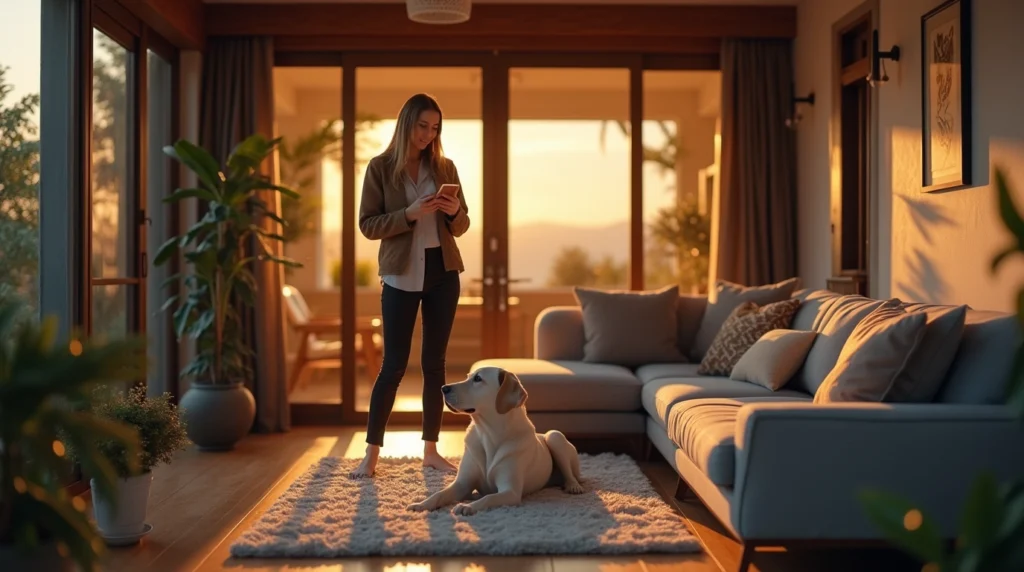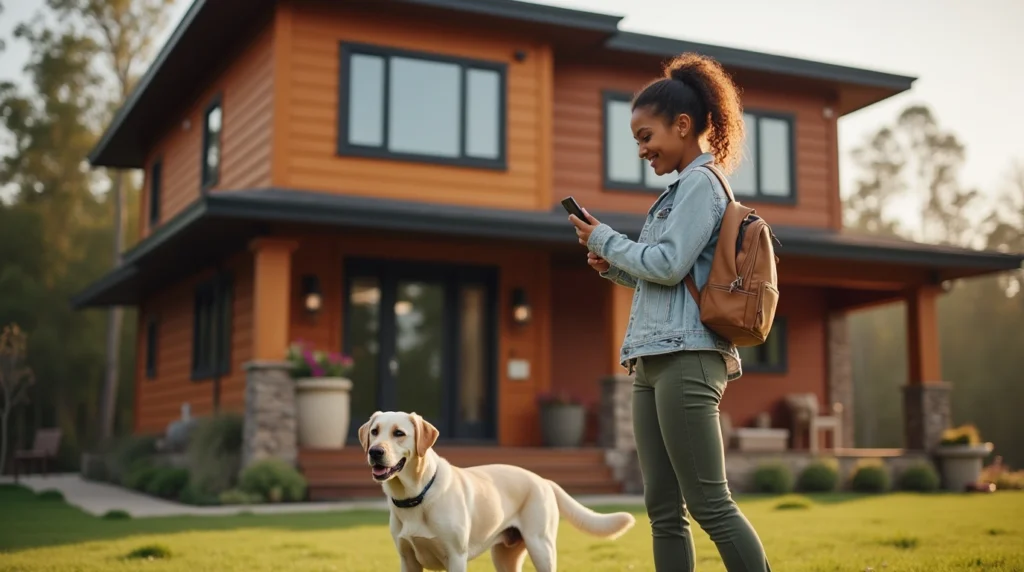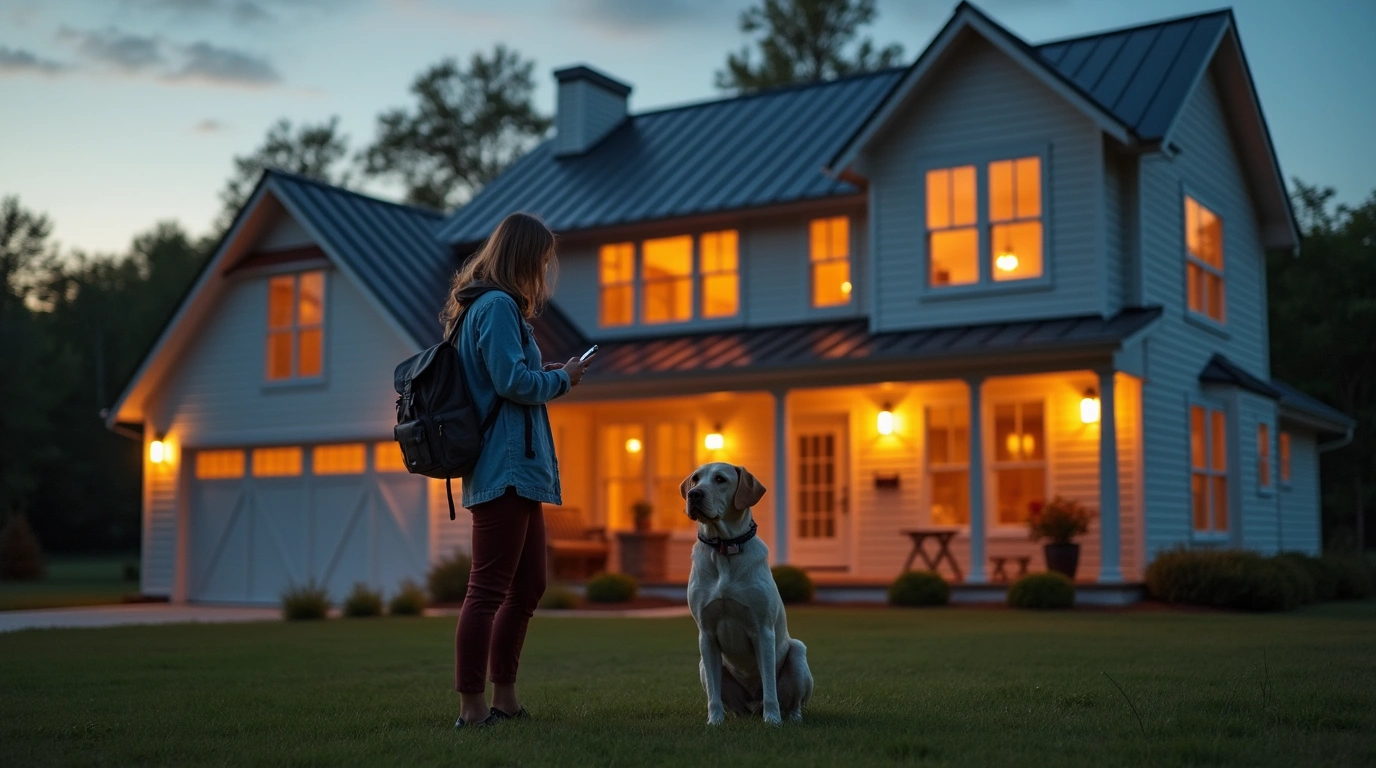Discover the 5 essential considerations when booking a pet friendly airbnb . Find the perfect accommodation for you and your furry companion with our expert guide.
Table of Contents
Traveling with pets has become increasingly popular as more people consider their furry companions to be integral family members rather than pets that can be left behind. Recent surveys indicate that over 65% of pet owners travel with their animals at least once a year, creating substantial demand for accommodations that welcome four-legged guests. While many hotels have begun to adapt with pet-friendly policies, a pet-friendly Airbnb often provides a superior experience for both pets and their owners. These private accommodations typically offer more space, home-like amenities, and fewer disturbances from other guests—all crucial factors when traveling with animals. However, not all pet-friendly Airbnb listings are created equal, and choosing the right one requires careful consideration of several key factors. This comprehensive guide explores five essential considerations when selecting a pet-friendly Airbnb, helping you ensure a comfortable, stress-free vacation experience for everyone in your traveling party—humans and animals alike. Whether planning a weekend getaway or an extended vacation, understanding these critical factors will help you find the perfect pet-accommodating home away from home.

Understanding the Pet-Friendly Airbnb Landscape
The Growth of Pet-Friendly Travel Accommodations
The market for pet-friendly accommodations has expanded dramatically in recent years, reflecting changing attitudes about pet ownership and travel. According to the American Pet Products Association (APPA), approximately 70% of U.S. households own a pet, representing about 90.5 million homes. This substantial pet-owning population has driven significant changes in the travel industry:
- Pet-friendly Airbnb listings have increased by approximately 80% since 2017
- Over 65% of pet owners report that they would extend their stay if accommodations welcomed their pets
- Pet travelers book longer stays on average (4.2 nights vs. 3.1 nights for non-pet travelers)
- Millennials and Gen Z travelers are particularly likely to seek out pet-friendly accommodations, with 77% reporting they plan vacations with their pets in mind
Brian Chesky, Airbnb’s CEO, has noted that pet-friendly accommodations consistently rank among the most searched filters on the platform, highlighting the growing importance of this market segment.
How Airbnb’s Pet Policies Work
Understanding how Airbnb handles pet policies is crucial for travelers planning trips with animal companions:
- Host-Determined Policies: Unlike hotel chains with standardized pet policies, each Airbnb host sets their own rules regarding pets
- Search Filters: Airbnb’s platform includes a “pets allowed” filter to help travelers identify suitable accommodations
- Varying Definitions: “Pet-friendly” may mean different things to different hosts—some welcome all pets, while others may accept only certain types or sizes
- Additional Fees: Many hosts charge pet fees ranging from $20-100 per stay or per pet
- House Rules Section: Detailed pet policies are typically outlined in the “house rules” section of a listing
It’s important to note that Airbnb’s service animal policy differs from its pet policy. According to Airbnb’s guidelines, hosts cannot refuse service animals regardless of their standard pet policy, though they can request documentation in some jurisdictions.

Types of Pet-Friendly Airbnb Accommodations
Pet-friendly Airbnb options come in various forms, each offering different advantages for pet travelers:
| Accommodation Type | Typical Benefits for Pets | Potential Limitations |
|---|---|---|
| Single-Family Homes | Private yards, more space, fewer noise concerns | May have more fragile furnishings |
| Apartments/Condos | Convenience, sometimes access to community areas | Limited outdoor space, noise restrictions |
| Cabins/Rural Properties | Natural surroundings, hiking opportunities, privacy | Potentially dangerous wildlife, limited services |
| Beachfront Properties | Water access, sand for digging, open spaces | Beach-specific pet restrictions, sand management |
| Urban Lofts | Walkability to pet-friendly attractions | Limited green space, city noise |
With this foundation established, let’s explore the five essential considerations when choosing a pet-friendly Airbnb.
Consideration #1: Property Features and Pet-Specific Amenities
Outdoor Spaces and Access
The availability and quality of outdoor spaces often define the pet experience at an Airbnb:
- Fenced Yards: Perhaps the most valuable feature for dog owners, a securely fenced yard provides safe off-leash time
- Garden/Yard Size: Sufficient space for play and exercise needs
- Security Considerations: Check fence height, gate latches, and potential escape routes
- Proximity to Walking Paths: Easy access to walking routes reduces transportation needs
- Natural Surroundings: Properties near parks, beaches, or trails enhance the pet travel experience
Lisa Montgomery, a frequent pet traveler from Colorado, shares: “We exclusively book properties with fenced yards when traveling with our border collie. It transforms the experience from constantly having to leash up and go outside to simply opening a door and letting her play while we enjoy coffee on the patio. Worth every extra dollar.”
Statistical insight: Properties with fenced yards command an average 15-20% premium in nightly rates for pet-friendly listings but boast 35% higher booking rates, reflecting their perceived value.
Interior Pet-Friendly Features
Thoughtful interior design considerations significantly impact pet comfort and safety:
- Flooring Types: Hardwood, tile, or luxury vinyl flooring is more pet-friendly than carpeting or delicate materials
- Furniture Policies: Clear understanding of whether pets are allowed on furniture
- Stair Gates/Pet Barriers: Helpful for controlling access to certain areas
- Temperature Control: Adequate heating and cooling for pet comfort when left alone
- Window Security: Securely screened windows prevent escapes or injuries
- Open Floor Plans: Easier supervision and movement for pets
Michael Chang, pet-friendly Airbnb host in Austin, explains his approach: “We renovated with pets in mind, installing scratch-resistant flooring, providing furniture covers, and creating built-in feeding stations in the kitchen. These investments were substantial but have resulted in consistently higher occupancy rates and excellent reviews from pet owners.”
Dedicated Pet Amenities
The most outstanding pet-friendly Airbnb listings include specialized amenities specifically for animal guests:
- Food and Water Bowls: Basic but essential items that save packing space
- Pet Beds and Blankets: Comfortable sleeping arrangements
- Toys and Enrichment Items: Entertainment options for pets
- Waste Management Supplies: Poop bags, litter boxes, or specialized cleanup tools
- Pet First Aid Kits: Emergency supplies for minor issues
- Treat Welcomes: Special welcome treats or toys for pet guests
These amenities signal hosts who genuinely welcome pets rather than merely tolerating them. According to Airbnb host data, properties offering three or more pet-specific amenities receive an average rating 0.4 stars higher from pet-traveling guests compared to basic pet-friendly listings.
Jennifer Wilson, who travels nationally with her two terriers, notes: “When a host provides quality pet beds, bowls, and toys, it immediately sets the tone for our stay. It shows they’ve thought about all their guests—not just the human ones—and usually indicates the property will truly be comfortable for our whole family.”
Consideration #2: Clear Understanding of Pet Policies and Restrictions
Pet Size, Breed, and Number Restrictions
Pet policies vary dramatically between hosts, making careful review essential:
- Weight Limits: Many hosts set maximum weight restrictions (often 25-50 pounds)
- Breed Restrictions: Some hosts exclude certain breeds, often reflecting insurance policy limitations
- Number of Pets: Limits on how many pets are permitted per reservation
- Pet Type Restrictions: Some listings welcome dogs but not cats, or vice versa
- Age Requirements: Policies regarding puppies or kittens who may not be fully trained
James Rodriguez, who manages 12 pet-friendly Airbnb properties in Florida, explains: “We implemented a 40-pound weight limit after several incidents with larger dogs causing damage. However, we make case-by-case exceptions for well-behaved larger breeds when guests communicate in advance and have positive reviews from other hosts.”
Pet Fee Structures and Deposits
Financial considerations related to pet stays vary widely:
- Flat Pet Fees: One-time charges ranging from $20-$150 per stay
- Per-Pet Charges: Additional fees for each pet beyond the first
- Per-Night Pet Fees: Some hosts charge daily rather than per-stay fees
- Refundable Deposits: Security deposits specifically for potential pet damage
- Cleaning Fee Implications: Some hosts incorporate pet cleaning into standard fees, while others add surcharges
Understanding these costs before booking helps avoid surprises at checkout. According to Airbnb data, the average pet fee for U.S. listings is approximately $75 per stay, though this varies significantly by region, property type, and amenities offered.
House Rules Specific to Pets
Detailed house rules establish clear expectations for pet behavior:
- Furniture Access: Rules about pets on furniture or beds
- Supervision Requirements: Whether pets can be left unattended in the property
- Noise Policies: Expectations regarding barking or other pet sounds
- Cleaning Expectations: Requirements for hair removal or accident cleanup
- Outdoor Policies: Rules for pet waste management, leash requirements on property
- Designated Pet Areas: Specific spaces where pets are or are not permitted
Travel blogger Maria Sanchez, who documents her experiences in pet-friendly accommodations, advises: “Always message the host before booking to discuss any house rules that might be problematic for your specific pet. For instance, my dog has separation anxiety, so properties requiring pets never be left alone wouldn’t work for us, even briefly. Most hosts appreciate this proactive communication.”
Service Animals vs. Pets Distinction
Understanding the important legal distinctions between service animals and pets:
- Legal Protection: Service animals are protected under the Americans with Disabilities Act and similar legislation internationally
- Acceptance Requirements: Hosts cannot legally refuse service animals even in “no-pet” listings
- Fee Exemptions: Service animals are typically exempt from pet fees
- Documentation Considerations: What hosts can and cannot ask regarding service animals
- Different Rules Application: House rules may apply differently to service animals vs. pets
Attorney Robert Thompson, who specializes in accommodation law, clarifies: “Many travelers and hosts misunderstand service animal provisions. True service animals—those trained to perform specific tasks for people with disabilities—must be accommodated regardless of standard pet policies, and pet fees cannot legally be charged. However, emotional support animals have different legal status depending on jurisdiction.”
Consideration #3: Location and Neighborhood Pet-Friendliness
Proximity to Pet-Friendly Attractions
The surrounding area significantly impacts your pet travel experience:
- Dog Parks: Nearby options for off-leash exercise and socialization
- Pet-Friendly Beaches: Access to beaches that permit dogs, including off-leash areas
- Walking Trails: Availability of scenic walking paths suitable for pets
- Pet-Friendly Dining: Restaurants with pet-welcoming outdoor seating
- Pet Stores and Supply Shops: Convenient access to forgotten supplies or emergency needs
Research by the travel website BringFido shows that 72% of pet travelers consider the availability of nearby pet-friendly activities when selecting accommodations, making location a critical factor beyond the property itself.
Travel writer Thomas Chen recommends: “I always check a 1-2 mile radius around potential Airbnbs for pet amenities. A property might be perfect, but if there’s nowhere to walk or exercise your dog nearby, the experience won’t be enjoyable. Google Maps satellite view can quickly show if there are green spaces nearby.”
Local Pet Regulations and Leash Laws
Understanding local regulations prevents unfortunate surprises:
- Leash Requirements: Local ordinances regarding leash use in public spaces
- Breed-Specific Legislation: Some communities have restrictions on certain dog breeds
- Beach and Park Access Rules: Seasonal or time-of-day restrictions for pets
- Wildlife Protection Areas: Restrictions due to sensitive habitat or wildlife concerns
- License Requirements: Some jurisdictions require temporary licenses for visiting pets
Rebecca Martinez, who documents pet policy changes in tourist areas, notes: “Pet regulations can change seasonally, particularly in beach communities where summer restrictions are common. Always verify current rules rather than relying on outdated information, especially for popular tourist destinations.”
Neighborhood Safety Assessment
Safety considerations for pets extend beyond the property itself:
- Traffic Patterns: High-traffic areas pose greater risks during walks
- Sidewalk Availability: Crucial for safe walking in urban environments
- Lighting for Evening Walks: Important for night-time bathroom breaks
- Wildlife Concerns: Presence of dangerous wildlife like coyotes or venomous snakes
- Neighborhood Dog Population: Areas with many resident dogs may create territorial issues
Statistical insight: According to veterinary emergency data, pet injuries during travel most commonly occur during walks in unfamiliar areas, highlighting the importance of neighborhood assessment.
Emergency Veterinary Services
Access to veterinary care provides essential peace of mind:
- Proximity to Emergency Veterinary Clinics: Location of 24/7 veterinary services
- Regular Veterinary Offices: Options for non-emergency but urgent care
- Average Response Times: In rural areas, understanding how quickly help can arrive
- Mobile Veterinary Services: Availability of veterinarians who make house calls
- Host Recommendations: Local knowledge about preferred veterinary providers
Dr. Melissa Thompson, a veterinarian specializing in travel medicine, advises: “I recommend pet travelers identify the nearest emergency clinic to their accommodation before arrival and save the contact information. In an emergency, you don’t want to be searching for this information while also dealing with a pet in distress.”
Consideration #4: Host Experience with Pets and Communication Quality
Host’s Personal Pet Experience
Hosts with personal pet ownership experience often provide more thoughtful accommodations:
- Current Pet Owners: Often have greater understanding of pet needs and behaviors
- Property Design Considerations: May have intentionally created pet-friendly spaces
- Problem Anticipation: Better at predicting and preventing common pet-related issues
- Empathy Factor: Typically more understanding of normal pet behaviors and accidents
- Local Knowledge: Often more informed about neighborhood pet resources
Lisa Johnson, an Airbnb Superhost with five pet-friendly properties, shares: “As a lifelong dog owner, I’ve designed my properties with pets in mind—from the durable flooring to the secure fencing. I understand that happy pets mean happy guests, and this philosophy has resulted in a 60% repeat booking rate among pet travelers.”
Statistical insight: Reviews of pet-friendly Airbnbs indicate that properties owned by hosts who mention their own pets in their profiles receive an average of 0.8 stars higher ratings from pet-traveling guests.
Communication Quality and Responsiveness
Effective communication with hosts is particularly important for pet travelers:
- Pre-Booking Pet Discussions: Willingness to discuss specific pet needs before booking
- Response Time to Questions: Crucial for clarifying pet-related concerns
- Clarity in Communication: Detailed, unambiguous answers about pet policies
- Flexibility: Willingness to make reasonable accommodations for specific pet needs
- Problem-Solving Approach: How hosts handle unexpected pet-related situations
Digital nomad and frequent pet traveler Carlos Mendez advises: “Before booking, I send hosts specific questions about my dog’s needs. Their response tells me everything—not just the answers themselves, but how quickly they reply and whether they seem genuinely welcoming or merely tolerant of pets. This screening has prevented countless problems.”
Previous Guest Experiences with Pets
Reviews from previous pet-owning guests provide valuable insights:
- Pet-Specific Review Comments: Look for mentions of pet experiences in reviews
- Recurring Themes: Patterns in pet-related feedback across multiple reviews
- Problem Resolution Stories: How hosts handled any pet-related issues
- Photo Evidence: Guest photos showing pets enjoying the space
- Host Responses to Pet Feedback: How constructively hosts respond to pet-related suggestions
Travel blogger Jennifer Sanchez recommends: “I specifically search reviews for keywords like ‘dog,’ ‘pet,’ or ‘cat’ to find relevant feedback from other pet owners. These firsthand accounts reveal far more than the listing description ever could, especially about how genuinely pet-friendly the property and host actually are.”
Host’s Pet Knowledge and Resources
The host’s familiarity with pet needs enhances the experience:
- Local Veterinary Contacts: Providing emergency and routine care information
- Pet Service Recommendations: Knowledge of local walkers, sitters, or groomers
- Pet-Friendly Activity Suggestions: Personalized recommendations for the area
- Pet-Specific Welcome Materials: Dedicated information for pet owners
- Special Needs Accommodation: Understanding of and preparation for different pet requirements
Michael Davis, who manages pet-friendly vacation rentals in Colorado, explains his approach: “We maintain a comprehensive pet guide for each property, updated quarterly with seasonal activities, current policies at nearby parks, and verified veterinary information. This resource has significantly reduced guest questions and improved reviews, while genuinely enhancing the pet travel experience.”
Consideration #5: Reviews, Photos, and Verification of Pet-Friendly Claims
Critical Review Analysis
Thorough review analysis provides crucial insights beyond basic ratings:
- Pet-Specific Mentions: Search reviews for pet-related comments
- Negative Review Patterns: Recurring issues mentioned by multiple guests
- Host Responses: How hosts address pet-related concerns
- Review Timeframe: Recent vs. older reviews may reflect policy changes
- Comparative Language: How pet-friendly features compare to other properties guests have experienced
Susan Chen, who analyzes accommodation trends, notes: “Pet-related reviews tend to be extremely detailed compared to general reviews, offering specific insights about features rarely mentioned in listings, like fence security or neighborhood dog-friendliness. These details are gold for prospective guests.”
Statistical insight: According to Airbnb data analysis, properties with five or more positive pet-specific reviews command 12% higher nightly rates than comparable listings new to the pet-friendly market.
Photo Verification of Pet-Friendly Features
Images provide crucial verification of pet-friendly claims:
- Yard Enclosure: Photos showing fence height, condition, and security
- Flooring Surfaces: Evidence of pet-friendly flooring throughout the property
- Pet Amenities: Images of provided pet beds, bowls, or other amenities
- Potential Hazards: Identifying issues like gaps in fencing or dangerous plants
- Space Assessment: Evaluating actual room sizes and layouts for pet suitability
Professional photographer and pet travel enthusiast Rebecca Wong advises: “Look beyond the curated listing photos. Check guest photos in reviews, ask hosts for specific images of pet areas, and use satellite images to verify yard claims. I’ve avoided several potential disasters by noticing fence issues in background details of otherwise appealing photos.”
Virtual Verification Options
Technology offers additional verification methods:
- Video Tours: Request or look for video walkthroughs showing pet areas
- Virtual Meetups: Some hosts offer pre-booking video calls to discuss pet needs
- Google Street View: Assess neighborhood walkability and surroundings
- Mapping Tools: Verify proximity to pet amenities claimed in listing
- Social Media Verification: Some hosts maintain Instagram or Facebook pages with additional property images
Travel technology consultant James Parker explains: “The pandemic normalized virtual property tours, which are particularly valuable for pet travelers. A 5-minute video call with a host walking through pet-specific features provides more actionable information than dozens of static photos or lengthy message exchanges.”
Cross-Referencing with Pet Travel Sites
Specialized resources can provide additional verification:
- BringFido Listings: Properties may be separately reviewed on pet travel sites
- Local Pet Blog Recommendations: Area-specific pet travel resources
- Veterinary Tourism Resources: Verification through professional pet travel networks
- Pet Travel Forums: Firsthand accounts from other traveling pet owners
- Social Media Groups: Dedicated communities for pet travelers often discuss specific properties
Maria Thompson, founder of a pet travel review platform, notes: “Specialized pet travel resources often provide more detailed, pet-specific information than general travel sites. Cross-referencing Airbnb listings with these resources can reveal both red flags and hidden gems not apparent from the listing alone.”
Preparing for a Successful Pet-Friendly Airbnb Stay
Pre-Arrival Preparation
Proper preparation ensures a smooth experience for everyone:
- Packing Checklist: Ensure all essential pet supplies are packed
- Pet Travel Documents: Organize vaccination records and health certificates
- Host Communication: Confirm arrival details and any last-minute pet questions
- Travel Exercise: Help pets expend energy before arrival at the accommodation
- Familiar Items: Bring beds, toys, and other comfort objects from home
Veterinary behaviorist Dr. Sarah Martinez recommends: “Set your pet up for success by maintaining as many familiar elements as possible. Their own bed, toys, and feeding schedule create continuity in an unfamiliar environment, significantly reducing stress-related behaviors that could impact your stay.”
Managing Pet Behavior in an Airbnb
Responsible pet management protects both the property and your future reviews:
- Initial Property Inspection: Check for hazards or escape routes upon arrival
- Gradual Acclimation: Allow pets to adjust to new surroundings slowly
- Consistent Rules: Maintain the same behavior expectations as at home
- Anxiety Management: Monitor for and address signs of travel anxiety
- Noise Consideration: Manage barking or other disruptive behaviors
- Accident Prevention: Maintain regular bathroom schedules to prevent incidents
Professional dog trainer Elena Rodriguez advises: “The first 30 minutes in a new accommodation sets the tone for your pet’s entire stay. Calmly establish boundaries, reward relaxed behavior, and create positive associations with the new space. This investment of time prevents most common behavior problems during vacation stays.”
Cleaning and Checkout Considerations
Leaving a good impression ensures continued host enthusiasm for pet guests:
- Pet Hair Management: Regular cleaning throughout your stay minimizes accumulation
- Damage Documentation: Immediately report any pet-related accidents or damage
- Final Cleaning Steps: Special attention to areas your pet used most
- Checkout Procedures: Follow any pet-specific departure instructions
- Review Etiquette: Provide constructive feedback about the pet-friendly experience
Airbnb Superhost Michael Chang shares: “What impresses me most isn’t guests whose pets cause zero impact—that’s unrealistic. Rather, I appreciate guests who communicate openly about minor issues and make reasonable efforts to leave the property in good condition. These responsible pet owners are always welcome back.”
Leaving Helpful Reviews for Future Pet Travelers
Detailed reviews help build the pet-friendly accommodation community:
- Pet-Specific Details: Mention features that particularly worked for your pet
- Accuracy Assessment: Note how well the listing described the actual pet experience
- Host Interaction: Describe how the host handled any pet-related requests or issues
- Neighborhood Insights: Share discoveries about local pet amenities not mentioned in the listing
- Balanced Feedback: Provide constructive suggestions alongside positive comments
Travel blogger Lisa Martinez emphasizes: “Detailed pet-focused reviews are incredibly valuable to the community. I always mention specific features like fence height, nearby walking routes I discovered, and how my anxious rescue dog responded to the space. These details help future travelers make better-informed decisions based on their own pets’ needs.”
FAQ Section: Pet-Friendly Airbnb Travel
How can I verify that a “pet-friendly” Airbnb is truly suitable for my specific pet?
Beyond checking the “pets allowed” filter, consider these verification strategies:
- Message the host with specific questions about your pet’s size, breed, and needs
- Request additional photos of outdoor areas, flooring, or pet-specific amenities
- Search reviews for mentions of similar pets to yours
- Ask about the host’s personal experience with pets
- Inquire about specific potential issues (e.g., “Is the yard fully fenced?” or “Are there stairs my senior dog would need to navigate?”)
The most reliable verification comes from direct communication with hosts before booking. Be specific about your pet’s needs and behaviors, as “pet-friendly” can mean different things to different hosts. A property perfect for a quiet senior cat might be unsuitable for an energetic young retriever, even though both fall under “pet-friendly” listings.
What additional costs should I budget for when booking a pet-friendly Airbnb?
When planning your budget for a pet-friendly Airbnb stay, consider these potential additional costs:
- Pet fees: $20-150 per stay (average $75)
- Additional pet fees: Some properties charge per pet
- Cleaning fee increases: Often higher for pet-friendly properties
- Security deposits: May be larger for reservations with pets
- Pet insurance: Consider travel-specific coverage for unexpected veterinary needs
- Local pet licenses: Some municipalities require temporary permits
- Pet amenities: Budget for supplies not provided by the host
Request a complete breakdown of all pet-related charges before booking to avoid surprises. Some hosts build pet fees into higher nightly rates while advertising “no pet fee,” so compare total costs rather than just the pet fee when evaluating options.
What should I do if my pet has an accident or causes damage at an Airbnb?
If your pet causes damage during your stay:
- Address the immediate issue (clean up accidents, secure any damaged items)
- Communicate with the host promptly and honestly, ideally with photos
- Offer fair compensation appropriate to the damage
- Document the incident and your resolution efforts
- Follow the host’s preferred procedure for handling the situation
Professional pet sitter and frequent traveler Maria Garcia advises: “Transparency is crucial. Most hosts understand that accidents happen, but they appreciate guests who communicate openly rather than trying to hide issues. I always travel with specialized pet stain cleaners and offer to cover reasonable repair costs if something significant occurs. This professional approach has resulted in hosts welcoming me back despite minor incidents.”
How can I help my pet adjust to staying in an unfamiliar Airbnb?
To help your pet adjust to a new environment:
- Bring familiar items like beds, toys, and blankets from home
- Maintain consistent feeding and walking schedules when possible
- Allow time for careful exploration of the new space under supervision
- Create a designated “safe space” with their bed and familiar items
- Use calming aids if your pet is prone to travel anxiety (consult your veterinarian)
- Provide extra exercise before arrival to reduce nervous energy
- Consider natural calming supplements recommended by your veterinarian
Veterinary behaviorist Dr. James Wilson explains: “The key to successful accommodation adjustment is creating environmental consistency while allowing gradual exploration. Most pets settle within 24 hours if given appropriate support. Anxiety during the first day is normal, but persistent stress signals warrant additional intervention strategies.”
What should I look for in a pet-friendly Airbnb for a long-term stay?
For extended stays with pets, prioritize these additional considerations:
- Laundry facilities for pet bedding and accident management
- Proximity to veterinary care, including specialists if your pet has health conditions
- Climate control appropriate for all expected weather during your stay
- Storage space for bulk pet supplies and food
- Neighborhood safety for repeated daily walks
- Noise considerations for long-term harmony with neighbors
- Yard maintenance expectations if outdoor space is included
- Relationship potential with the host for ongoing communication
Remote worker Thomas Chen, who stays in pet-friendly Airbnbs for 2-3 months at a time, shares: “For stays longer than a week, I prioritize properties with washable everything, excellent HVAC systems, and genuinely pet-passionate hosts. The amenities that seem minor during a weekend become crucial during a month-long stay. I also research local pet communities for socialization opportunities during extended visits.”
Conclusion: Creating Memorable Experiences in
pet friendly airbnb Accommodations
Finding the ideal pet-friendly Airbnb requires thoughtful consideration of multiple factors, but the reward is a truly inclusive vacation experience where every family member—including those with four legs—can feel comfortable and welcome. By carefully evaluating property features, understanding pet policies, assessing location pet-friendliness, communicating effectively with hosts, and verifying claims through reviews and photos, you can significantly increase your chances of booking a genuinely pet-friendly accommodation rather than merely a property that tolerates animals.
The growth of the pet travel market continues to drive improvements in the quality and quantity of pet-friendly Airbnb options. Hosts who genuinely welcome pets with thoughtful amenities, secure outdoor spaces, and pet-knowledgeable service are seeing the benefits through higher occupancy rates, premium pricing power, and exceptional reviews. Meanwhile, travelers who approach pet-friendly stays with preparation, responsibility, and clear communication help strengthen this ecosystem of pet-inclusive travel.
Remember that the perfect pet-friendly accommodation balances your needs, your pet’s specific requirements, and reasonable expectations of a property that isn’t your home. With proper research and preparation, a pet-friendly Airbnb stay can provide not just a place to sleep, but meaningful experiences and memories that include every member of your family.
Have you discovered exceptional pet-friendly Airbnb properties or developed strategies for successful pet travel? Share your experiences in the comments to help fellow pet travelers navigate their next adventure!




